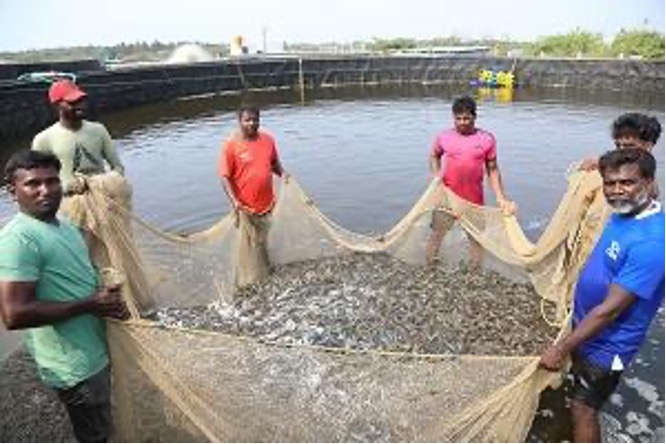The ICAR-Central Institute of Brackish water Aquaculture (CIBA) in Chennai has achieved a significant milestone in sustainable aquaculture with the release of its maiden shrimp harvest from a pioneering new-age farming system. This breakthrough holds promise for transforming shrimp farming practices in India, marking a crucial advancement for the country’s fisheries sector.
The pilot project, conducted under the Pradhan Mantri Matsya Sampada Yojana (PMMSY), reflects India’s commitment to sustainable fisheries development. Launched in the union budget 2019-20, PMMSY aims to drive a Blue Revolution by fostering the sustainable growth of the fisheries sector over a five-year period (2020-2025).
ICAR-CIBA’s innovative shrimp farming system, supported by funding from the Department of Fisheries, integrates cutting-edge technologies into a unified production framework. This approach represents a paradigm shift in aquaculture methodologies, promising to enhance efficiency and sustainability.
The success of the new-age shrimp farming system was demonstrated by the impressive yield of 1.57 tons of shrimp from a single 500 cubic meter circular tank. This achievement underscores the efficacy and scalability of the pioneering approach.
Key features of the innovative system include circular self-cleaning ponds, advanced feeding automation, intelligent aeration systems, and in-situ natural feed production mechanisms. These features contribute to optimizing production processes while minimizing environmental impact.
By leveraging state-of-the-art technologies, ICAR-CIBA’s initiative sets a precedent for modernizing shrimp farming practices in India. The adoption of such innovative systems not only boosts productivity but also promotes sustainability, aligning with the objectives of PMMSY.
Moving forward, initiatives like ICAR-CIBA’s new-age shrimp farming system are poised to play a crucial role in driving the Blue Revolution envisioned by PMMSY. As India strives towards achieving self-sufficiency in seafood production and promoting sustainable fisheries, such advancements pave the way for a prosperous future in aquaculture.

